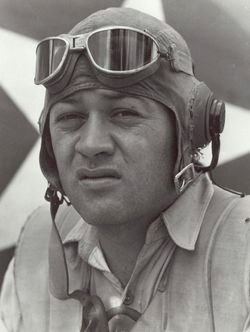World War II Medal of Honor Recipient. He served during World War II as a Major in the United States Marine Corps Reserve and as commander of Marine Fighter Squadron 214. He was awarded the Medal of Honor for his bravery in Central Solomons area from September 12, 1943 to January 3, 1944. His citation reads "For extraordinary heroism and valiant devotion to duty as commanding officer of Marine Fighting Squadron 214 in action against enemy Japanese forces in the Central Solomons area. Consistently outnumbered throughout successive hazardous flights over heavily defended hostile territory, Maj. Boyington struck at the enemy with daring and courageous persistence, leading his squadron into combat with devastating results to Japanese shipping, shore installations, and aerial forces. Resolute in his efforts to inflict crippling damage on the enemy, Maj. Boyington led a formation of 24 fighters over Kahili on 17 October and, persistently circling the airdrome where 60 hostile aircraft were grounded, boldly challenged the Japanese to send up planes. Under his brilliant command, our fighters shot down 20 enemy craft in the ensuing action without the loss of a single ship. A superb airman and determined fighter against overwhelming odds, Maj. Boyington personally destroyed 26 of the many Japanese planes shot down by his squadron and, by his forceful leadership, developed the combat readiness in his command which was a distinctive factor in the Allied aerial achievements in this vitally strategic area". Major Boyington was also awarded the United States Navy's second highest honor, the Navy Cross. He had served in the Marine Corps previous to World War II, but resigned in to join General Claire Chennault's "Flying Tigers" in China, with whom he shot down 6 Japanese aircraft. He re-enlisted in the Marine Corps after Pearl Harbor, (going through some difficulty in doing so, due to his reputation as a undisciplined brawler), and was assigned a squadron of Marine Pilots who would become known as the "Black Sheep" due to the fact they were scrapped together by Major Boyington, and didn't go through the formal unit training and assignments in the United States. Major Boyington, being much older than his men, gained the sobriquet "Pappy," partially for his age, partially for the way he looked after his men. His "Black Sheep" became one of the top fighter units in US Service, having shot down a confirmed 97 Japanese aircraft, 35 probable ones, damaged 50, and destroyed 21 on the ground. He himself scored 22 kills (his official Medal of Honor citation is in error in that regard). In January 1944 he was shot down over the island of Rabaul and was captured by a Japanese submarine. He spent the remaining balance of the War as a prisoner, never having reported as captured by the Japanese Military authorities. His Medal of Honor was issued to him by the US Navy with the belief it was posthumous. During his 20 months of as a prisoner, he was tortured like many Americans in Japanese hands. In 1947 he was medically retired with the rank of Colonel, USMC. In 1958 he published his book "Baa Baa Black Sheep," a true account of his war, POW and post war experiences.
Source: Find a Grave

PRIVATE CITIZENS SUPPORTING AMERICA'S HERITAGE
American
War Memorials Overseas, Inc.
War Memorials Overseas, Inc.
Boyington Gregory H. “Pappy”
Name:
Gregory H. “Pappy” Boyington
Rank:
Colonel
Serial Number:
Unit:
Marine Fighting Squadron 214 (VMF-214)
Date of Death:
1988-01-11
State:
Idaho
Cemetery:
Arlington National Cemetery Arlington, Arlington County, Virginia,
Plot:
Section 7A, Site 150
Row:
Grave:
Decoration:
Medal of Honor
Comments:
